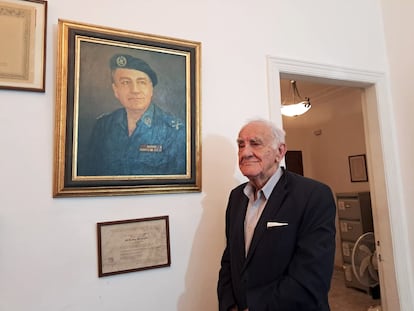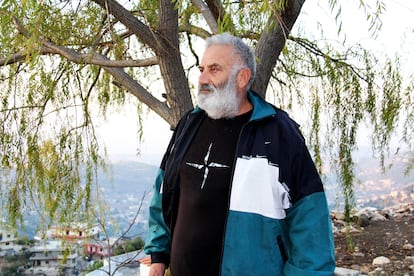Lebanese army seeks to vindicate itself between Israel’s sword and Hezbollah’s wall
Lebanon’s underfunded but popular Armed Forces are playing a key role in the country’s bid for an unlikely ceasefire deal that Israel refuses to agree to

An old television set sits in the corner of the room where a group of retired soldiers meet in Akkar al-Atiqa to discuss how to organize the aid they are distributing to those displaced by the war in Lebanon, since the intensification of Israeli bombing in September. The north of the country, where this town of 17,000 inhabitants is located, is a remote place from Beirut. Not because of the distance — just over 80 miles — but because of the battered asphalt, flanked by trash, which speaks of a country in ruins. The forgotten region of Akkar is, however, the breeding ground for what is considered the only popular institution of this absent government: the Lebanese Armed Forces and its approximately 80,000 soldiers. “Fifty percent of them come from this area,” says non-commissioned officer Haytham Khalil, 55.
“Honor, sacrifice, loyalty.” This is the motto of an army that is powerless to intervene in the war, faced with the military might of the Israeli Goliath and with its hands tied in subjecting Hezbollah — the Shia militia that is also the dominant political party in Lebanon and whose arsenal is superior to that of the Armed Forces — to its authority. Relegated to the role of uninvited guests in the war, the country’s government now intends to turn its fragile army into the guarantor of a ceasefire proposal that Israel has already rejected.
The country’s acting Prime Minister Najib Mikati called on Monday at the summit of Arab countries in Riyadh, Saudi Arabia, for the international community to press for an immediate cessation of hostilities. He then pointed out his government’s commitment “to UN Resolution 1701″ — which includes the withdrawal of the militia from Lebanon’s southern border — “the strengthening of the deployment of the Lebanese army in the south” in cooperation with the UN peacekeepers of UNIFIL, and “the extension of the state’s authority to all its internationally recognized borders.”
Mikati announced on November 6 that he would recruit 1,500 soldiers to send “5,000 additional troops to join the 4,500 already deployed” on the country’s southern border if the ceasefire were to be signed, something that would require the unlikely prior approval of Hezbollah, without which any agreement would be a worthless scrap of paper. UN Resolution 1701, which ended the last war with Israel in 2006, obliges both the Israeli army and the militia to withdraw troops and weapons from the territory south of the Litani River. The truce document foresees that UNIFIL and the Lebanese army guarantee this withdrawal and are the only forces deployed along the dividing line between the two countries, but that offer is not enough for Israel, which wants its soldiers, and also its warplanes, to have carte blanche to enter Lebanese territory, according to the American media Axios.
In the 18 years since Resolution 1701 was passed, “Israel has violated Lebanese air and naval space 36,000 times,” while Hezbollah has reinforced “its positions and built tunnels and missile ramps” along the country’s southern border, says retired general Khalil Helou. Since October 2023, when the party-militia resumed firing rockets at Israel in solidarity with Gaza, Lebanon has recorded 3,243 dead and more than 14,100 wounded. Following the ground offensive that began on October 1, at least 37 towns and 40,000 homes have been destroyed by Israeli strikes.
The only ones who have so far withdrawn from the southern border are the 4,500 Lebanese soldiers referred to by Mikati on Monday. Ten Lebanese soldiers have been killed in the war and only on one occasion has the Lebanese army defended itself. That was on October 3, when its soldiers opened fire after Israeli troops killed one of their own in the southern town of Bint Jbeil.
The Lebanese Armed Forces have so far lacked “a mandate from the government to take over the defense of the country,” says Sergeant Medyen Mohamed Al Assaad at the headquarters of the Akkar al-Atiqa Retired Military Movement. “If they told us to put on our uniforms and go fight, we would go right now,” he says, while his colleagues nod in agreement. And they would do so “even with our bare hands.”
Without weapons
This is hardly a metaphor. Lebanon’s military expenditure in 2023 was around $240 million; Israel’s reached almost $28 billion, according to estimates by the Stockholm International Peace Research Institute (SIPRI). The Lebanese Armed Forces lack anti-aircraft defenses and fighter jets. Their weapons, which are outdated, are often donated by other countries. Far from being comparable to Israel and its latest-generation F-35s, their arsenal is also not as strong as that of Hezbollah, which is believed to have accumulated between 120,000 and 200,000 projectiles before Israeli bombing decimated its leadership and probably also its stockpiles.
If Hezbollah refuses to disarm, the Lebanese army will be powerless to force the militia to do so. Not only because of its political power or the under-equipped regular military, but because part of the Lebanese population would see it as a betrayal in the face of Israel. Also because it would undermine its reputation for neutrality within the confessional system in place in Lebanon, and would lead to the desertion of many Shia soldiers, the community from which the party-militia draws its strength. Such a decision could revive the ghost that haunts the Lebanese; that of the civil war that ended in 1990 and its more than 100,000 dead.
The Lebanese Armed Forces are even less able to fight Israel. Even without considering the Lebanese state’s lack of mandate in this regard, nor Israel’s overwhelming military superiority, Israel also has the unwavering support of the United States. Additionally, if the Lebanese army has remained afloat in recent years, it is in part thanks to the approximately $3 billion in military aid granted by Washington since 2006.

The fragility of the Lebanese army is not a coincidence, adds retired General Hisham Jaber in his office in Beirut. In 2008, the U.S. “threatened [President Michel] Sleiman with punishment” if he accepted “the donation of an anti-aircraft defense system and several helicopters from Russia. This threat came from Israel,” says the former military commander of the Lebanese capital.
Social work
During the war, retired soldiers from Akkar al-Atiqa have been busy in the social work that also underpins the popularity of the army. The trunks of their cars, parked in front of the headquarters of their movement, are full of pasta, biscuits, and blankets for the displaced people to whom they have given shelter. The absence of the Armed Forces on the front is as noticeable as their presence on the streets. In the towns that host many of the 1.2 million displaced by the war, “there has been friction” between Shias, Sunnis and Christians that, “without the presence of the military,” could “have degenerated,” believes the analyst Khalil Helou.
Imad Salman, 62, another retired soldier who was displaced with his family from Aabbassiyeh in the south, says that Akkar al-Atiqa has welcomed his family “as guests, not as displaced persons.” This former officer, who is staying in a house provided by a fellow soldier, states: “I am Shia, but above all, I am Lebanese and a soldier. The army is the backbone of national unity.”

A 2019 Arab Barometer survey found that 91% of Lebanese considered their army to be immune to the corruption that prevails in the country, despite the fact that their economic situation is “miserable,” says Sergeant Al Assaad. In 2018, a soldier earned “the equivalent” of about $1,000. In 2019, the Lebanese currency was devalued by 90% and that salary plummeted in some cases to $34. The current salary of a private soldier is “about $200”; that of an officer, about $595, estimates Al Assaad. In 2020, the Lebanese government authorized members of its Armed Forces to take on multiple jobs and many work in their free time as cab drivers, mechanics, or bus drivers.
“Lebanon has excellent soldiers and officers,” says General Jaber, who estimates that at least $5 billion in weapons would be needed for the Lebanese army to be able to take over the defense of the country. The $200 million pledged at the conference to support Lebanon in Paris on October 24 “is a drop in the ocean.”
Sign up for our weekly newsletter to get more English-language news coverage from EL PAÍS USA Edition
Tu suscripción se está usando en otro dispositivo
¿Quieres añadir otro usuario a tu suscripción?
Si continúas leyendo en este dispositivo, no se podrá leer en el otro.
FlechaTu suscripción se está usando en otro dispositivo y solo puedes acceder a EL PAÍS desde un dispositivo a la vez.
Si quieres compartir tu cuenta, cambia tu suscripción a la modalidad Premium, así podrás añadir otro usuario. Cada uno accederá con su propia cuenta de email, lo que os permitirá personalizar vuestra experiencia en EL PAÍS.
¿Tienes una suscripción de empresa? Accede aquí para contratar más cuentas.
En el caso de no saber quién está usando tu cuenta, te recomendamos cambiar tu contraseña aquí.
Si decides continuar compartiendo tu cuenta, este mensaje se mostrará en tu dispositivo y en el de la otra persona que está usando tu cuenta de forma indefinida, afectando a tu experiencia de lectura. Puedes consultar aquí los términos y condiciones de la suscripción digital.








































